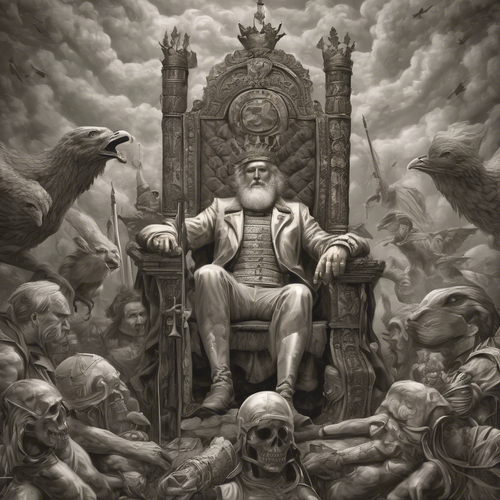When Was the Last Time the U.S. Had a King?
Imagine a nation born not from revolution but from fealty, where subjects bowed before a throne rather than casting ballots. Picturesquely absurd, isn’t it? Yet this scenario paints a vivid portrait of the early colonial days, where the specter of monarchy lingered like a shadow. What does it mean, then, to be a country that once toyed with the idea of royal rule, only to fiercely reject it? 🏰
A Rebellious Beginning: The Rise of American Republicanism
Historically, America’s relationship with kings has been akin to a long-standing grudge match. Our last “king” in a formal sense was King George III of Britain, whose reign was marked by turmoil across the Atlantic. Like a persistent thundercloud, his policies prompted the colonies to demand independence, culminating in the Revolutionary War—a tumultuous fight that ultimately birthed a republic and the concept of self-governance. Yet, one must pause and wonder: Was his tyrannical grip the true catalyst for a democratic fervor, or were we simply itching for a reason to sever ties with tradition? 🔗
“A king’s power is like a compass that points only towards his own interests; this nation’s founding fathers chose to throw that compass into the sea,” reflected historian Dr. Amelia Stokes, highlighting the philosophical rift that propelled America towards democracy.
Colonial Aspirations: The Reign of Royal Governors
Before our institution of democracy, America was a patchwork of colonies, each with its own appointed governors, often acting as stand-ins for the crown. These governors, akin to overseers of a vast estate, wielded power yet were never truly kings. The irony of the situation? These supposed caretakers had no more love for the crown than their constituents. They found themselves squashed between the demands of London and the rebellious spirits of their neighbors. Picture a juggler trying to harmonize a dozen flaming torches—endlessly precarious and destined for calamity! 🔥
Revolutionary Whispers: The Call for Independence
The echoes of revolution rang clear through pamphlets and town meetings—a call to arms that pitted loyalists against patriots in a battle for sovereignty. The Declaration of Independence, a document both declarative and subversive, encapsulated the ethos of the moment: “All men are created equal,” suggesting a destiny as complex as the weave of an intricate tapestry. Here, the juxtaposition of ideals and realities creates a striking antithesis—freedom unspooled against the backdrop of past oppression.
Symbols of Leadership: From Monarchy to Democracy
When America emerged from the fire of war, it scorned the notion of a hereditary ruler, establishing instead a system of elected officials—a court of representatives rather than subjects. But where does this leave us in a landscape populated by figures of authority? It’s a curious transformation: from the formal attire of a king to the tailored suits of elected officials, a shift not just of garments but of ideals. Thus, the presidency became a modern iteration of monarchic power, albeit voluntarily bestowed and revocable—an open invitation to political circus instead of a closed-door coronation. 🎩
Reflections on Authority: An Evolving Narrative
Even in a democracy, we often find ourselves ensnared by the allure of charismatic leadership—the quintessential ‘king’ avatar morphing into political figures whom we bestow with almost regal admiration. It begs the question: do we really desire kings in cloaks of culture and charisma? Are elections merely a form of flattering our need for hierarchy in a landscape where we preach equality? The paradox thrives, like a sprouting weed—its roots buried deep despite the soil being overturned. 🌱
A Curious Legacy: The American Monarchical Dream
In the current climate, the USA exhibits a curious fascination with royal ceremonies, as seen in the extravagant global coverage of royal weddings and events. Like moths to a flame, we watch, entranced by the pomp and pageantry—a reminder that while we have discarded kings, we are not entirely free from their allure. One must wonder, then, if the idea of monarchy in America is akin to a flickering candle in a darkened room: a light we yearn for, but dare not embrace entirely. 🕯️
Conclusion: Reigning in Independence
The last true king of the United States was not residing in a castle but rather sitting on the British throne—a figure unwelcome to those who sought change. As we navigate the complexities of democracy, it is both a gift and a burden to govern ourselves. America’s evolution from monarch to democracy is a dance of ideals, steeped in history and human nature, grappling ultimately with our perennial grappling against authority. From crowns to ballots, we’ve traded the golden scepter for the ballot box, but the echoes of those kings still linger, sometimes, perhaps, serving as a cautionary tale against the ease of placing power on a pedestal once more. 👑











Is it possible that Americas last king wasnt during the Revolution, but much later in history? Lets discuss!
I think America lost its last king when it embraced democracy. But hey, could a royal comeback be the next big trend? 🤔👑 #RoyalRevival
I cant believe some think we shouldve kept a king in the US! How would that even work in todays world? Absurd!